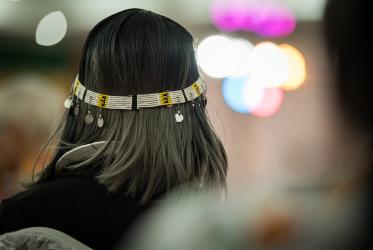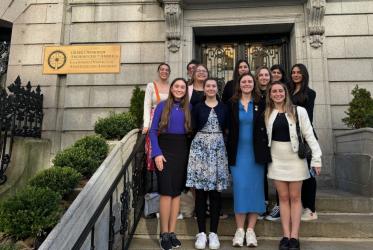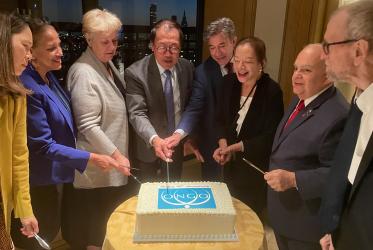From 16-27 April, the United Nations headquarters in New York City is hosting the 17th Session of the Permanent Forum on Indigenous Issues. The World Council of Churches (WCC) is assisting the participation of a representative of the Ecumenical Indigenous Peoples Network Reference Group (EIPNRG) and co-sponsored a public event that explored ways that the church can move into a new phase of interaction with indigenous communities.
This year’s edition of the UN Permanent Forum is focusing on indigenous peoples’collective rights to land, territory and resources. Through the Ecumenical United Nations Office (EUNO), the WCC is facilitating the presence of EIPNRG’s Milena Rincón, from Colombia, who works as the global program director for Christian Peacemaker Teams.
“Indigenous peoples’ relationship with the lands is fundamental for their survival, identity, and self-determination”, said Rincón. “It is our responsibility to guarantee and protect the full enjoyment of their collective right to land, including respecting their own practices and traditions”.
The EIPNRG presented a message to the 17th session of the Permanent Forum, in which it states that “the recognition of Indigenous Peoples’collective right to land creates a fertile space for peace where Indigenous Peoples can practice their cultures, utilize their knowledge, and share ancient stories that remind all humanity of our interconnectedness to one another”.
On 17 April, the WCC co-sponsored an event hosted by the United Methodist Church’s General Board of Church & Society (GBCS) entitled ‘Moving from Apologies and Acts of Repentance to Acts of Justice and Transformation’.
“Indigenous nations are not members of the current organizational configuration of the UN”, reminded Rev. Dr Liberato Bautista, from the GBCS. “A new paradigm of international relations appears to be urgent to bring the UN closer to its preambular statement of ‘we the peoples of the United Nations’”, he said.
“It seems to me that this statement provides the possibility of reconfiguring the United Nations to include indigenous peoples and their nations. The role of faith-based organizations, even given its baggage with respect to the Doctrine of Discovery, can play a significant role in this regard”, added Bautista.
The Doctrine of Discovery is a concept of public international law expounded by the United States Supreme Court in which colonial powers laid claim to lands belonging to foreign sovereign nations during the Age of Discovery.
In 2012, the WCC Executive Committee released the “Statement on the doctrine of discovery and its enduring impact on Indigenous Peoples,” repudiating the Doctrine of Discovery, as a historical basis and legal precedent for policies and laws that continue to marginalize indigenous peoples and rejecting “the idea that Christians enjoy a moral and legal right based solely on their religious identity to invade and seize indigenous lands and to dominate Indigenous Peoples”.
Read the message of the Ecumenical Indigenous Peoples Network Reference Group submitted to the forum
2012 statement of the WCC Executive Committee on the Doctrine of Discovery







